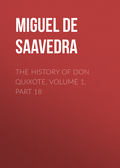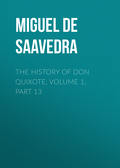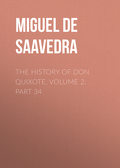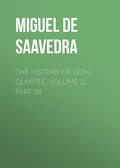
Мигель де Сервантес Сааведра
The History of Don Quixote, Volume 2, Part 28
"Why, how so?" asked Don Quixote; "hast thou come upon aught?"
"Ay, and aughts," replied Sancho; and shaking his fingers he washed his whole hand in the river along which the boat was quietly gliding in midstream, not moved by any occult intelligence or invisible enchanter, but simply by the current, just there smooth and gentle.
They now came in sight of some large water mills that stood in the middle of the river, and the instant Don Quixote saw them he cried out, "Seest thou there, my friend? there stands the castle or fortress, where there is, no doubt, some knight in durance, or ill-used queen, or infanta, or princess, in whose aid I am brought hither."
"What the devil city, fortress, or castle is your worship talking about, senor?" said Sancho; "don't you see that those are mills that stand in the river to grind corn?"
"Hold thy peace, Sancho," said Don Quixote; "though they look like mills they are not so; I have already told thee that enchantments transform things and change their proper shapes; I do not mean to say they really change them from one form into another, but that it seems as though they did, as experience proved in the transformation of Dulcinea, sole refuge of my hopes."
By this time, the boat, having reached the middle of the stream, began to move less slowly than hitherto. The millers belonging to the mills, when they saw the boat coming down the river, and on the point of being sucked in by the draught of the wheels, ran out in haste, several of them, with long poles to stop it, and being all mealy, with faces and garments covered with flour, they presented a sinister appearance. They raised loud shouts, crying, "Devils of men, where are you going to? Are you mad? Do you want to drown yourselves, or dash yourselves to pieces among these wheels?"
"Did I not tell thee, Sancho," said Don Quixote at this, "that we had reached the place where I am to show what the might of my arm can do? See what ruffians and villains come out against me; see what monsters oppose me; see what hideous countenances come to frighten us! You shall soon see, scoundrels!" And then standing up in the boat he began in a loud voice to hurl threats at the millers, exclaiming, "Ill-conditioned and worse-counselled rabble, restore to liberty and freedom the person ye hold in durance in this your fortress or prison, high or low or of whatever rank or quality he be, for I am Don Quixote of La Mancha, otherwise called the Knight of the Lions, for whom, by the disposition of heaven above, it is reserved to give a happy issue to this adventure;" and so saying he drew his sword and began making passes in the air at the millers, who, hearing but not understanding all this nonsense, strove to stop the boat, which was now getting into the rushing channel of the wheels. Sancho fell upon his knees devoutly appealing to heaven to deliver him from such imminent peril; which it did by the activity and quickness of the millers, who, pushing against the boat with their poles, stopped it, not, however, without upsetting and throwing Don Quixote and Sancho into the water; and lucky it was for Don Quixote that he could swim like a goose, though the weight of his armour carried him twice to the bottom; and had it not been for the millers, who plunged in and hoisted them both out, it would have been Troy town with the pair of them. As soon as, more drenched than thirsty, they were landed, Sancho went down on his knees and with clasped hands and eyes raised to heaven, prayed a long and fervent prayer to God to deliver him evermore from the rash projects and attempts of his master. The fishermen, the owners of the boat, which the mill-wheels had knocked to pieces, now came up, and seeing it smashed they proceeded to strip Sancho and to demand payment for it from Don Quixote; but he with great calmness, just as if nothing had happened him, told the millers and fishermen that he would pay for the bark most cheerfully, on condition that they delivered up to him, free and unhurt, the person or persons that were in durance in that castle of theirs.
"What persons or what castle art thou talking of, madman? Art thou for carrying off the people who come to grind corn in these mills?"
"That's enough," said Don Quixote to himself, "it would be preaching in the desert to attempt by entreaties to induce this rabble to do any virtuous action. In this adventure two mighty enchanters must have encountered one another, and one frustrates what the other attempts; one provided the bark for me, and the other upset me; God help us, this world is all machinations and schemes at cross purposes one with the other. I can do no more." And then turning towards the mills he said aloud, "Friends, whoe'er ye be that are immured in that prison, forgive me that, to my misfortune and yours, I cannot deliver you from your misery; this adventure is doubtless reserved and destined for some other knight."
So saying he settled with the fishermen, and paid fifty reals for the boat, which Sancho handed to them very much against the grain, saying, "With a couple more bark businesses like this we shall have sunk our whole capital."
The fishermen and the millers stood staring in amazement at the two figures, so very different to all appearance from ordinary men, and were wholly unable to make out the drift of the observations and questions Don Quixote addressed to them; and coming to the conclusion that they were madmen, they left them and betook themselves, the millers to their mills, and the fishermen to their huts. Don Quixote and Sancho returned to their beasts, and to their life of beasts, and so ended the adventure of the enchanted bark.







